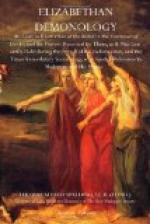[Footnote 1: See Dr. Carpenter in Frazer for November, 1877.]
[Footnote 2: See Jenkins v. Cooke, Law Reports, Admiralty and Ecclesiastical Cases, vol. iv. p. 463, et seq.]
[Footnote 3: Ibid. p. 499, Sir R. Phillimore.]
[Footnote 4: Law Reports, I Probate Division, p. 102.]
81. It is perfectly impossible for us, therefore, to comprehend, although by an effort we may perhaps bring ourselves to imagine, the horror and loathing with which good men, entirely believing in the existence and omnipresence of countless legions of evil spirits, able and anxious to perpetrate the mischiefs that it has been the object of these pages in some part to describe, would regard those who, for their own selfish gratification, deliberately surrendered their hopes of eternal happiness in exchange for an alliance with the devils, which would render these ten times more capable than before of working their wicked wills. To men believing this, no punishment could seem too sudden or too terrible for such offenders against religion and society, and no means of possible detection too slight or far-fetched to be neglected; indeed, it might reasonably appear to them better that many innocent persons should perish, with the assurance of future reward for their undeserved sufferings, than that a single guilty one should escape undetected, and become the medium by which the devil might destroy more souls.
82. But the persecuted, far more than the persecutors, deserve our sympathy, although they rarely obtain it. It is frequently asserted that the absolute truth of a doctrine is the only support that will enable its adherents successfully to weather the storms of persecution. Those who assent to this proposition must be prepared to find a large amount of truth in the beliefs known to us under the name of witchcraft, if the position is to be successfully maintained; for never was any sect persecuted more systematically, or with more relentlessness, than these little-offending heretics. Protestants and Catholics, Anglicans and Calvinists, so ready at all times to commit one another to the flames and to the headsman, found in this matter common ground, upon which all could heartily unite for the grand purpose of extirpating error. When, out of the quiet of our own times, we look back upon the terrors of the Tower, and the smoke and glare of Smithfield, we think with mingled pity and admiration




